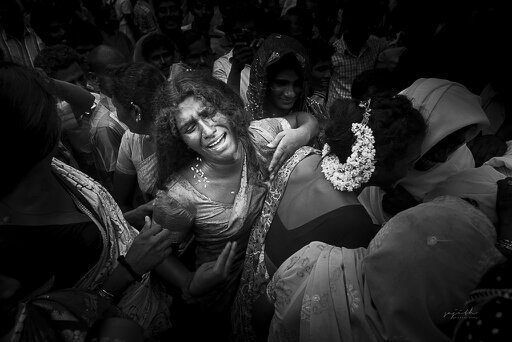
OPPARI: An Art of Weeping, Wailing and Lamenting
A group of women form a circle, lamenting and eulogizing; weeping and beating their chests; wailing and jumping to the beats played on the “Parai” (an instrument made of the cow skin). This is an ancient mourning practice called the “Oppari”, an art form that is predominantly performed in the state of Tamil Nadu and the North-Eastern part of Sri Lanka. The word Oppari is derived from two words “Oppumai” and “Aari” which means to proudly sing about a person using metaphors. Oppari was initially performed in the deaths of the Dalit families, to express the anguish felt at the death of the loved ones, especially the death of parents, husbands, son, daughters etc. but rarely in case of siblings. Throughout the Oppari there are guilty screams, falsetto repetitions, sobbing and raspy inhaling of air. The beauty of the art form is rich words play. There have been no written lyrics that the Oppari singers follow, rather it’s the synchronization of the laments to the beats of the parai, the emotions that are cultivated and the intense expressions. These women are externalizing the sadness, attachment, grief and tragedy, using phrases such as “Aahahahaaha”, “Aamaahahaa”, “Aappaahahaa”, “Aayayayaa”, “Yappa”, “Yamma” etc with other local idioms.
This art form did not stay in the Cheris (ghettos), it turned out to be a livelihood. Over time, the upper caste families began to invite these Oppari singers to the deaths in their family to perform overnight in order to keep them awake. Even though these Oppari singers, do not know the dead person they recall the moments they have spent with their family members, it could be their parents, husbands, daughters or sons, relate it to the emotional attachment they have had with the person and began the Oppari with crying, eulogizing laments, exaggerating affection to the dead and beating their chest and jumping in grief. Further, the performance is enhanced with improvised lyrics and rich words play. Hence, these women began to weep for strangers professionally.
Paul Gauguin once said, “Art is either plagiarism or revolution”. But unfortunately, Oppari grew as a root cause for various forms of discrimination these women faced. While being a Dalit woman itself has a social stigma around it, the fact that they performed at deaths, kept them away from the so-called auspicious events like marriages, house warming, etc and they were made to carry the stigma of death with them. In spite of Oppari being an art form that requires recognition for its rich words play and the metaphors spun throughout the performance, it has predominately been considered as impure and excluded from the mainstream art forms. While urban spaces have seen disappearing collective mourning, the Oppari in rural spaces is not passed on to the next generations due to the stigma of death and caste it carries with it and hence, the art form is at its extinction phase.
Author – Yashashwani Srinivas
Masters in Women’s Studies, Tata Institute of Social Sciences
Image credit – Quora




+ There are no comments
Add yours